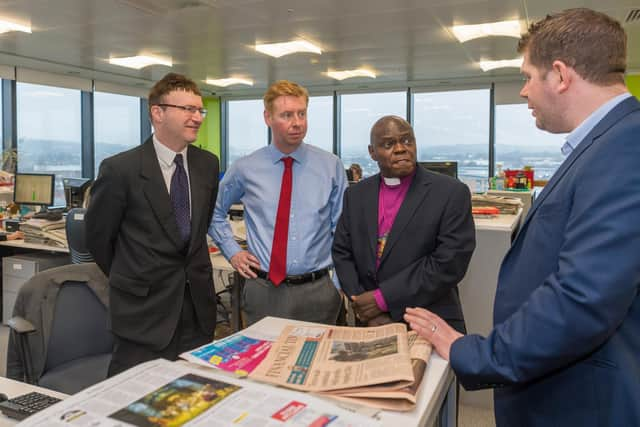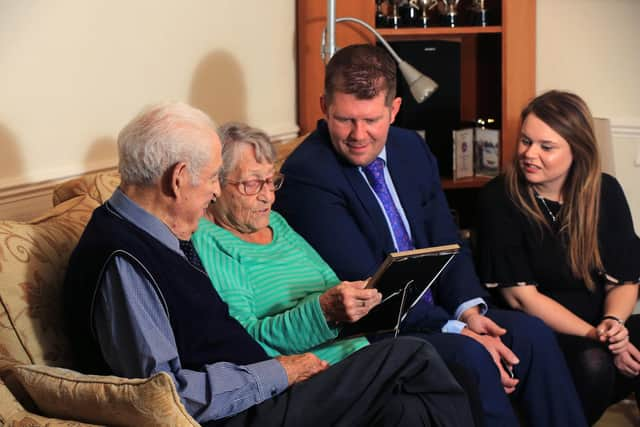Meaningful local journalism is under threat - and only you can save it
Mr Knight opened the session in anodyne enough fashion: at least, on the face of it. As he welcomed members and panel member experts alike, he teed up the forthcoming conversation thus: “This is the latest hearing into the sustainability of local journalism.”
Now, bear with me a moment before I come back to that, because as I watched the debate unfold in keen anticipation of answers to some of the sometimes debilitating questions staring back at me as the editor of The Yorkshire Post, I barely noticed the chairman’s preamble to the substance of the meeting.
Advertisement
Hide AdAdvertisement
Hide AdBut, having re-watched the session, his introduction poses as profound a conundrum for British society, modern democracy and the balance of power between decision makers and ordinary people as we have ever faced.


In the Mother of all Parliaments, the founding guardian of democracy, what was up for debate was whether or not local journalism can survive. They were gathered to contemplate the prospect of towns, cities and villages the nation over no longer having a local news voice; no longer having legally trained, ethically conscientious, accuracy conscious journalists observing and recording life in their communities, people whose raison d’etre is the betterment of the community they serve.
So, I find myself wondering:
Have we done enough to communicate to the country what is at stake should public interest journalism at the grassroots level of their lives disappear?
Do people actually care about the work we do? The campaigning - often for the have nots in our communities - the exposés that reveal corruption; the questions we ask of politicians at every level - from parish councils to the Palace of Westminster. Do people care?


Advertisement
Hide AdAdvertisement
Hide AdWell, according to Reuters’ Digital News Report 2021 there is justified cause for concern vis-a-vis the latter. In answer to a question posed in that report: ‘Should Governments Step In’ they said: “Though many publishers, policy makers, and academics worry about the future of local (and national) media, our report this year suggests that most ordinary people don’t share these concerns.”
Evidencing that conclusion, the report adds: “Across countries, only around a third (31%) were aware that many commercial news outlets were less profitable than they were a decade ago and the majority (53%) are not worried about this. Just a quarter (27%) would support any government intervention to help commercial media, with another three in ten (29%) not having a view on the issue.”
So: Should Governments Step In? I’ll return to that one later.
Reading between the lines of the entire report, the crux of the challenge appears to be trust; in the UK, the Reuters research states, just 36 per cent of people trust ‘most of the news, most of the time.’ Compare that with Finland (65%) and Denmark (59%). Clearly, here in the UK, we have a problem - a problem worthy of further thought.
Why?
Advertisement
Hide AdAdvertisement
Hide AdNow, I will not rake over some of the well-documented misdemeanors of some of this country’s national press - the tabloids in particular - but we must acknowledge the damage caused by them because for sure local journalism and journalists have had their reputations denigrated by proxy and misguided association.
How often do we see, depressingly, hashtags like #ScumMedia bandied around social media platforms, a broad brush weapon designed to discredit all journalism and smear all journalists - even the most hard-working, honest and well-meaning in our industry - national and local. All too often, too, we see local, regional and national media outlets and their journalists - good and not so good - lumped together as the so-called MSM - mainstream media - when individuals or groups seek to discredit journalism that conflicts with their own world view, the insinuation being that we are all in the pockets of the State.
Equally, and in my view infinitely more damaging to the relationship between reader and publisher as the crimes of the phone hackers et al is the mind-boggling proliferation of misinformation, deceptions and downright lies that have ripped through the digital media landscape, like a Japanese Knotweed undermining the foundations of the internet: the information superhighway is riddled with potholes.
For an explanation on how that impacts on people, I turn back to the Digital, Culture, Media and Sport select committee and an exchange between Damian Green, Conservative MP for Ashford and Jonathan Heawood, Executive Director for The Public Interest News Foundation.
Advertisement
Hide AdAdvertisement
Hide AdMr Green was interested in the panel of experts’ views on social media, and suggested people may well trust it more than local news publishers. He said: “I am struck increasingly that if people want to rely on a local source and that local source - if my email inbox is anything to go by - is often their local Facebook group, that may well say ‘a car is broken down on this road so don’t go that way’ - but is also saying this is what’s really happening in Ukraine, whilst not being entirely accurate, so; is there competition from below, as it were: if people see it on Facebook, they believe it?”
The reply to the question delighted me (because it confirms something I have been feeling but, until now, haven’t been quite able to articulate) and terrified me (because in that moment a penny dropped for me) in equal measure:
“I don’t know if they DO believe it,” said Jonathan Heawood. “Though they certainly do inhale it so what can happen is you have a miasma of semi-belief, quasi-belief. Like you’re living in constant smoke and you’re never sure if there’s fire or not,” said Mr Heawood.
With that ringing in your ears, I return to the question posed by that Reuters report: should governments intervene? Again, at risk of being accused of being a conspiracy theorist, I am minded to flex that question. Perhaps the question should be: why WOULD a government intervene? Why WOULD a government want more tough questions from independent media? Journalists who shun the pound notes and promises of client journalism? Why would they invite more scrutiny? Why would they want the bewildering smoke that dizzies the electorate - a fog that is becoming thicker by the day - to clear? Doesn’t that discombobulation make for fertile ground for one who may wish to lure the lost with promises of smoke-free sunlit uplands?
Advertisement
Hide AdAdvertisement
Hide AdIn the second part of his answer Mr Heawood went on: “What you want is a situation where people are pretty confident that ‘if I have read it here, I am 99 per cent confident that it is true and if it’s not, I understand that they will correct their mistake’.”
And he is surely right? By YOU he means ordinary people. Us. Not necessarily those people in power whose intentions and actions may not always meet with utmost probity.
And so I will leave you with what I think lies at the heart of the sustainability of local journalism dilemma: should governments intervene? They should, but in doing so what do they have to gain?
The people who should intervene are, in fact, those with the most to lose. Us. It is we who must intervene, now. Because until we do, the smoke will not clear and that leaves us all more vulnerable to exploitation at the hands of the powerful.
Editor’s note: we know you don’t always have the time to read us, but you never know when someone in your community might need us. Protect your Yorkshire Post - subscribe HERE.